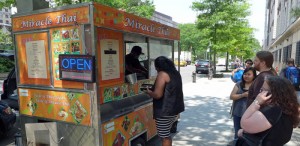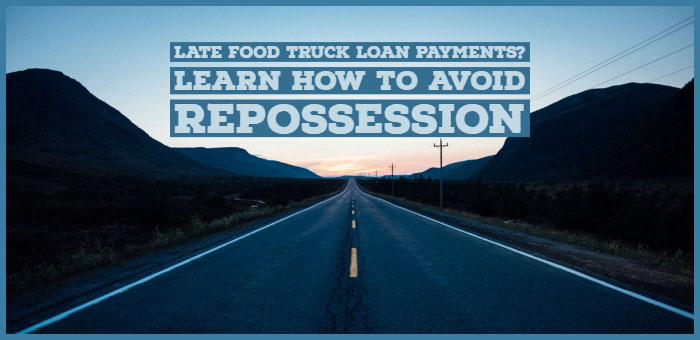No one likes rejection. Especially when it comes in the form of loan denials for your future food truck empire. Educating yourself about why businesses do or do not receive financing is the first step to taking control of your own destiny.
Today I share why both prospective and current food truck vendors are turned down for small business loans. Here are seven common reasons your food truck business might have received loan denials and what you can do if you get this bad news.
Prospective Vendors
- Not Enough Time In Business. Young businesses don’t make the cut for many types of business loans. Lenders like to see that your food truck has a history of on-time payments and financial success. Startup food trucks are still working on proof of concept, so if your company with less than a year or two in business are a riskier bet for lenders.
- No Collateral. Some online financing options will accept personal guarantees as collateral for your food truck loan. The problem is that many of the more flexible, larger loans with great terms require collateral in the form of your business assets. This might be your truck, kitchen equipment, or maybe even inventory.
- Your Personal Credit Score Is Too Low. Personal credit plays a huge role in your ability to qualify for a business loan. If you think of this from a lender’s perspective, your payment history is a good indicator of how responsible your business will be with payments.
- Bad Credit Score. Your personal credit score does factor into a small business loan, even if your company has been in business for a while. If you can’t manage your personal credit, the logic goes, how reliable will you be when it comes to paying back a business loan? If a poor credit score is the reason you are turned down, review your score and take steps to repair it.
- Unconvincing Business Plan: For new food trucks, a well-thought-out business plan is crucial if you want to get a business loan. It should convincingly outline how the business intends to generate profit, grow, and repay the loan. A lack of a solid business plan, or one that fails to address key market and financial strategies can lead to loan rejection.
Existing Vendors
- You Can’t Cover Your Debts. Lenders want to know that you can cover your current debts. To do this, they may calculate what’s called a debt-service coverage ratio. A lender might use, for example, a DSCR of 1.25 to qualify businesses for a loan. A DSCR of 1.25 would mean that, if you have a current debt obligation of $1,000, you’d need $1,250 in free cash to qualify for the loan. A DSCR of less than one indicates that your business has less free cash flow than its current amount of debt.
- Inadequate Cash Flow. Cash flow is one of the first things lenders look at when deciding whether to approve a food truck loan. They want to know that you have enough cash flow to not only cover your business expenses, but also pay back the loan and still have a little left over. If your cash flow is bad or you regularly experience seasonal slow times, that’s a red flag. Poor cash flow is a major cause of business failure, so if this is why your loan was rejected.
- Incomplete application, paperwork. One of the most common reasons food truck loan denials is that the applicant didn’t complete the application correctly or didn’t provide all the necessary backup information. Among the supporting documents most banks will ask for are a business plan, three to five years of business and personal tax returns, business bank account statements, financial statement/projections for the business, and your personal and business credit reports. The fix for this problem is easy. Get your paperwork in order before applying again.
What To Do If Receive Loan Denials

Opening a cart like this one can save you thousands in startup costs.
You were counting on getting that food truck loan, but the bank said no. What do you do next? Your first step should always be to find out the reason for the denial. Some bankers will be more specific while others won’t share details, but by law, banks must mail you a notice explaining the reasons why your food truck loan application was denied.
If you need a cash infusion for your food truck, there are options available that can cover you while you work on improving the factors needed to secure financing. Be aware: Some of these options carry higher interest rates than their counterparts. However, they’re useful as a stop-gap measure until you can get approved for the food truck loan you want.
If business age or credit is your problem but your personal credit is sound, consider business credit cards. Business credit cards allow you to make purchases on credit while building your business credit. Short-term online loans, invoice financing and equipment financing often have less stringent requirements than longer-term loans or traditional bank loans.
Another practical alternative is considering a food trailer or cart, which often comes with a lower cost compared to a full-scale food truck. While you may not be able to get a $75,000 loan for a food truck, you might qualify for a $20,000 loan that would allow you to get a trailer or cart.
What Can You Do?
When you are denied for a loan, you’ve usually got to get a bit more creative to get your business off the ground. Some ideas on my end. Maybe you could start a catering business first with lower startup costs? Maybe you could find someone will to lease you or rent out a food truck. Find ways to start small and make gradual progress toward a food truck.
Check your credit report for inaccuracies
Your credit report contains a wealth of personal information including your name, social security number, current and previous addresses. It also may include current and past employers. You report also includes all credit accounts that you have opened and the amount due on each account. Additionally, the report details any delinquencies on any of these accounts and any inquiries made by potential creditors.
Once you’ve received your report, check its accuracy. You can dispute any errors by submitting a letter to the credit reporting agency. After researching your claim, they will correct any false information. They will then send an updated report to you and potential creditors, and those who have requested your report in the past six months. If the agency denies your dispute, you can still submit a written statement to them explaining the error. This statement will be shown to lenders who pull your report.
Use the information to fix your credit
If your credit report is loaded with late payments, and you have a number of revolving accounts with high balances, you’ll have a difficult time getting a loan for the purchase of a food truck. Use the information on your report to help make you a more desirable lending candidate. If your balances are too high, take a few months to pay the majority of them off.
If you have too many late payments, consider finding a co-signer with little or no debt and a solid credit history. Since late payments and delinquencies stay on your record for seven years, you may not be able to fix your credit in a few months or even a few years. However, being well-informed can help you avoid surprises and prepare a contingency plan if need be.
To improve the chances of securing a loan, food truck owners should focus on strengthening their business plan, improving personal and business credit scores, demonstrating a clear path to profitability, and possibly seeking alternative financing options designed for startups or small businesses with less stringent requirements. There are also alternatives to getting a traditional loan like crowdfunding and putting some items on credit cards.
Things are looking bright for food truck owners. Rising employment is resulting in increased consumer spending. This good news is increasing business optimism, and owners of food trucks nationwide are making capital investments in their operations. However, access to capital is still a concern for many prospective and current food trucks, even with the increased lending by banks. Business owners who get turned down when applying for bank loans don’t always know why.




